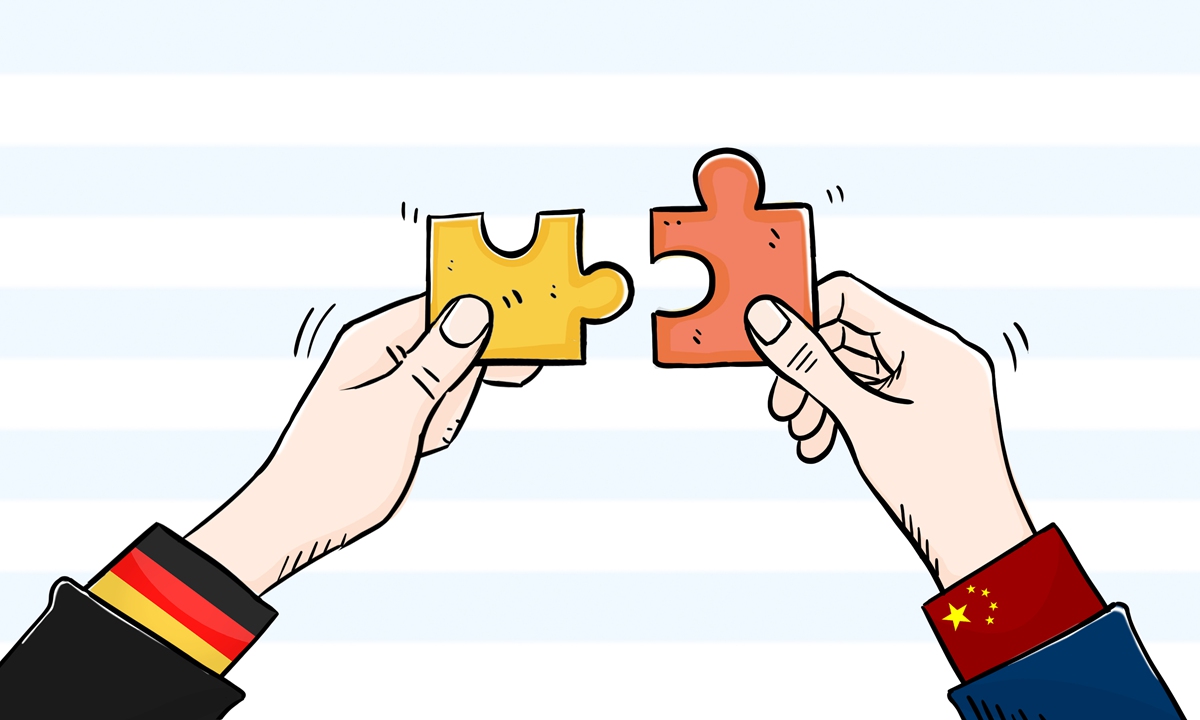
Illustration: Chen Xia/GT
The 2021 German federal election, which is scheduled to be held on September 26, is approaching. The Merkel era representing Germany's stability may come to an end. This means Germany will usher in a new political structure and zeitgeist following what was called a comfort phase of governance lasting for 16 years.
Due to changes in China's international status and China-EU relations in recent years, German ties with China have attracted unprecedented attention among the topics of the election. How to deal with relations with China will become the most important diplomatic agenda for the new German government in the future.
For a long time, Germany, led by Chancellor Angela Merkel, had been carrying out pragmatic policies. This includes prioritizing economic cooperation with China. Such policies have also played a decisive role in China-EU relations.
With the changes of German government structure and leaders, Germany may take geopolitical dimensions and value into consideration more. In the discussions about the policy on China, various German political parties have inherited the views of the document EU-China: A strategic outlook published in 2019. The document notes that, "China is, simultaneously, in different policy areas, a cooperation partner with whom the EU has closely aligned objectives, a negotiating partner with whom the EU needs to find a balance of interests, an economic competitor in the pursuit of technological leadership, and a systemic rival promoting alternative models of governance." This is also Germany's different perceptions of China in different fields.
However, almost all parties in Germany generally put "safeguarding values" and "reducing supply dependence" in a more prominent position in their China policy. Germany's Green Party, which has been out of power for nearly 16 years, holds the most radical and ideological ideas. These include advocating stricter trade barriers for Chinese products. It also takes a more resolute and critical attitude on human rights issues. Since Green Party plays an important role in almost all cabinet decisions, its China policy tendency will strongly influence the overall decision-making of the future government. It will be very different from the era when Joschka Fischer, former leader of the Green Party, was in charge of the party when he served as vice chancellor.
Behind the complexity of Germany's China policy are the changes in the economic competitiveness between China and Germany. There are also misunderstandings in Germany's view of the world thanks to its old diplomatic philosophy. In recent years, China's industrial competitiveness has been continuously enhanced with its growing economic strength, and its status as the world's largest trading country and manufacturing country has been continuously consolidated. Products of some industries from China have also become strong competitors of those made in Germany.
According to the research report of the German Mechanical Engineering Industry Association, China's machinery and equipment exports reached 165 billion euros ($192 billion) in 2020, accounting for 15.8 percent of the total export volume of machines and system, surpassing Germany for the first time and ranking first in the world. This is why Germany and the EU have increasingly voiced their concern, claiming that trade and investment must be protected under the banner of market equity and protecting competitiveness.
In recent years, the EU has constantly put forward new protective and restrictive policies and measures in the fields of economics, trade and investment. Many German enterprises and politicians mistakenly believe that Germany benefits less and less in China-Germany economic and trade relations. At the same time, in the context of the widening differences in values between China and the EU, some elites advocate trade protection under the banner of "safeguarding Western values."
Meanwhile, in the fields of ideology and values, political systems and the value of democracy and freedom advertised by Western countries have continuously shown signs of fading all over the world in recent years. Western countries' own institutional confidence and global image have been unprecedentedly questioned and challenged.
Meanwhile, the US has tried to lure European countries with "common values" and "democratic alliance" rhetoric under the background that the US is unable to solve its own problems. Washington is trying to tie its allies to the chariot of the new cold war between China and the US. In this context, many parties in Germany are confused between traditional political and diplomatic values and reality.
Some political parties in Germany regard transatlantic ties as one of the pillars of its foreign policy. But does it mean that Germany needs to conform to Washington's demands and rashly step on the path against China without weighing its own interests? These issues have led to endless debates in the German parliament and parties. Therefore, Germany's China policy has come to a crossroads because of the election. The question of how the two sides can learn to adapt to each other is quite essential.
Yet it is always a safe plan for both Germany and the EU to return to a rational and pragmatic China policy. Nowadays, countries in the world are closely connected by economic globalization. The interaction of trade, investment, information and people-to-people and cultural exchanges among countries has long been intertwined— especially between China and Germany. It is unimaginable for the two countries to retreat into two opposing camps with mutual isolation and confrontation.
We may need to face the new German government's process of forming a "learning curve" in its China policy, just as Chancellor Merkel herself came to her China policy from microphone diplomacy and values diplomacy. China has the confidence and patience to wait for the warm spring of China-Germany ties.
The author is a research fellow with the Institute of European Studies, China Institutes of Contemporary International Relations. opinion@globaltimes.com.cn

